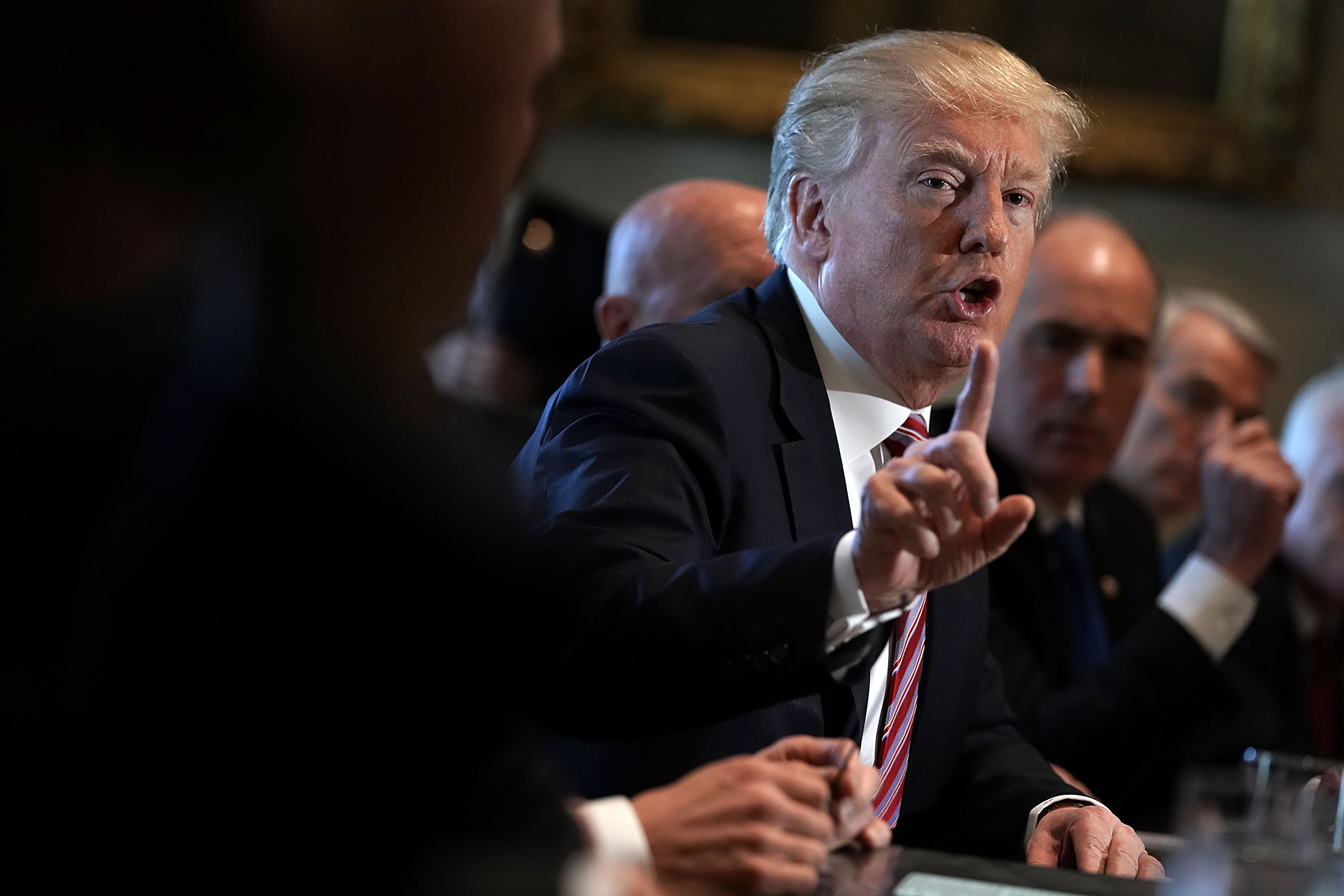Here come the big government Republicans!
How Republicans abandoned their conservative principles and embraced big government


Trumpublican conservatives love to compare America's 45th president to their revered Ronald Reagan. Both were populist. Both were scorned by the media. And both, of course, delivered bigly cut taxes.
But Reagan's Republican Party, built on enthusiasm toward markets and skepticism toward government, would never have embraced big government the way President Trump's party has.
Consider, for instance, the Trump administration's terrible idea about replacing food stamps with mail-delivered food boxes. Under President Trump's new budget proposal, some low-income households would receive packages with items such as shelf-stable milk, pasta, peanut butter, and canned fruits and vegetables — all purchased, packaged, and distributed by Uncle Sam. It's almost Soviet in its conceit.
Subscribe to The Week
Escape your echo chamber. Get the facts behind the news, plus analysis from multiple perspectives.

Sign up for The Week's Free Newsletters
From our morning news briefing to a weekly Good News Newsletter, get the best of The Week delivered directly to your inbox.
From our morning news briefing to a weekly Good News Newsletter, get the best of The Week delivered directly to your inbox.
It's also an almost perfect example of what Reagan Republicans used to deride as "big government." Instead of giving low-income Americans a debit card to spend on groceries of their choice — a relatively simple policy solution that seems to work pretty well — Team Trump would have government bureaucrats assemble and run a food distribution system across a continent-sized nation for more than 30 million people. It is exactly this sort of ill-conceived, poorly thought-out scheme that led Reagan to famously say, "The nine most terrifying words in the English language are 'I'm from the government, and I'm here to help.'"
The GOP used to know and appreciate that the government is good at some things, such as cutting Social Security checks, and bad at so many others. But somewhere, somehow, the party lost its way.
At the core of traditional center-right economic thinking is the idea that the world is a pretty complicated place, and no all-knowing bureaucrat or massive bureaucracy has enough information to efficiently distribute society's resources. In accomplishing that goal, decentralized market prices will always beat centralized government planning.
This idea that policymakers should show humility about what they can accomplish is critical to the philosophy of Friedrich Hayek. Indeed, Republicans were so freaked out about creeping socialism during the Obama presidency that they turned Hayek's 1944 warning against central planning, The Road to Serfdom, into an unlikely bestseller. And what better ideological champion for the burgeoning Tea Party movement than Hayek, the gloomy Austrian economist known for his attacks on interventionist John Maynard Keynes? Hayek was also a major influence on Reagan.
But this is Trump's GOP. No one really objects when the Republican vice president says, "The free market has been sorting it out and America's been losing," as Mike Pence did right after the 2016 election. So apparently it's time for big government to step in, whether by nudging companies to keep factories in the U.S., trying to reorder the global trading system, or creating another middle-class entitlement in the form of paid leave. Some big government GOPers are also itching to turn America's tech titans into heavily regulated utilities.
Then there's Trump's decision to hand-wave away a huge increase in federal debt and deficits. Before the Great Recession, the debt-to-GDP ratio was 35 percent. But the Trump tax cuts and increased spending in the recent budget deal could push debt to 109 percent of GDP in 2027, "higher than the previous record of 106 percent of GDP set just after World War II," notes the Committee for a Responsible Federal Budget.
But if the Trump GOP has now become the other party of big government, it is that only for some. For seniors, an important GOP constituency, their "earned benefits" through Medicare and Social Security are safe for now. They get the full Keynes. But for others, such as those whose key programs are income supports or Medicaid and might lean Democratic, it's back to Hayek for them. Big government for me, but not for thee.
Another big government party is not what America needs. Instead, we need a party of limited government that has thoughtfully considered what is the appropriate role of government and what should be left to the private sector. But there is little sign Republicans are ready to do this, or even think it's an important question to consider.
Sign up for Today's Best Articles in your inbox
A free daily email with the biggest news stories of the day – and the best features from TheWeek.com
James Pethokoukis is the DeWitt Wallace Fellow at the American Enterprise Institute where he runs the AEIdeas blog. He has also written for The New York Times, National Review, Commentary, The Weekly Standard, and other places.
-
 The JFK files: the truth at last?
The JFK files: the truth at last?In The Spotlight More than 64,000 previously classified documents relating the 1963 assassination of John F. Kennedy have been released by the Trump administration
-
 'Seriously, not literally': how should the world take Donald Trump?
'Seriously, not literally': how should the world take Donald Trump?Today's big question White House rhetoric and reality look likely to become increasingly blurred
-
 Will Trump's 'madman' strategy pay off?
Will Trump's 'madman' strategy pay off?Today's Big Question Incoming US president likes to seem unpredictable but, this time round, world leaders could be wise to his playbook
-
 Democrats vs. Republicans: who are the billionaires backing?
Democrats vs. Republicans: who are the billionaires backing?The Explainer Younger tech titans join 'boys' club throwing money and support' behind President Trump, while older plutocrats quietly rebuke new administration
-
 US election: where things stand with one week to go
US election: where things stand with one week to goThe Explainer Harris' lead in the polls has been narrowing in Trump's favour, but her campaign remains 'cautiously optimistic'
-
 Is Trump okay?
Is Trump okay?Today's Big Question Former president's mental fitness and alleged cognitive decline firmly back in the spotlight after 'bizarre' town hall event
-
 The life and times of Kamala Harris
The life and times of Kamala HarrisThe Explainer The vice-president is narrowly leading the race to become the next US president. How did she get to where she is now?
-
 Will 'weirdly civil' VP debate move dial in US election?
Will 'weirdly civil' VP debate move dial in US election?Today's Big Question 'Diametrically opposed' candidates showed 'a lot of commonality' on some issues, but offered competing visions for America's future and democracy


